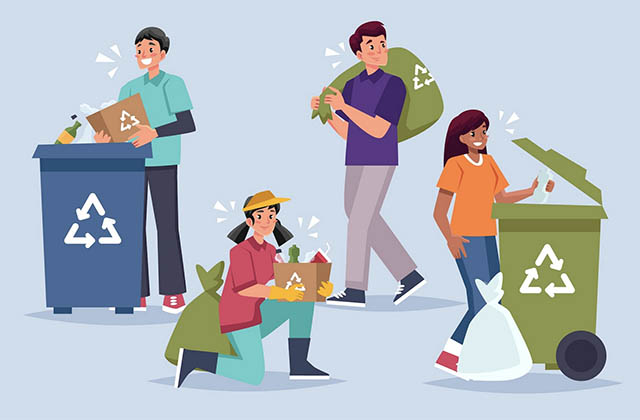Introduction
It is a common misconception that waste disposal is not important. However, improper disposal of solid wastes is not only harmful to human health but also causes pollution of water, soil, and air. The main aim of proper waste disposal is to protect the environment and human health. Below are ten facts that will help you understand how proper waste disposal works:
Recycling of glass reduces the need for raw materials.
Recycling glass reduces the need for raw materials. Glass is a valuable resource that is 100% recyclable. Glass is made from sand and recycled glass, which makes it a renewable resource that also contributes to reducing pollution. The process of recycling glass does not produce toxic chemicals and can be performed in an environmentally friendly manner; this makes it both clean and sustainable. With these facts about proper waste disposal you will appreciate how important the skip hire Adelaide.
Improper garbage disposal leads to environmental hazards.
There are a few things you need to know about proper garbage disposal. First, improper garbage disposal leads to environmental hazards. Second, it is one of the main reasons for the spread of diseases. Third, improper garbage disposal causes soil and water pollution. And lastly, it can cause air pollution as well
Recycling can turn waste into useful products.
Recycling can be done at home or in a commercial setting. Materials that are recycled can be used to make new products and packaging. The material may be turned into another product, like new plastic bottles, or it may be used as filler in another product like paper or cardboard.
Processing and recycling of used plastic bottles creates more jobs than landfilling or incineration.
Recycling of plastic bottles creates more jobs than landfilling or incineration. In fact, the processing and recycling of used beverage containers produces three times as many jobs as simply burying them in landfills. This is because recycling reduces the amount of waste that goes to landfills, which reduces raw materials needed to produce new products and thus requires fewer resources. It also preserves natural habitats by preventing plastic from entering waterways, rivers and oceans where it can harm marine life like turtles or fish that ingest it while mistaking it for food.
Recycling reduces the amount of waste that goes to landfills.
Recycling reduces the amount of waste that goes to landfills.
Recycling is the process of making a product from materials that would otherwise be thrown away or recycled. Recycling helps reduce energy usage and greenhouse gas emissions, as well as conserve resources. It can also reduce local pollution and make our world a cleaner place!
Glass products take millions of years to decompose in a landfill.
Glass products take millions of years to decompose in a landfill.
Glass is not a natural resource or renewable resource, and it is certainly not biodegradable. In fact, glass products are considered non-biodegradable by the EPA because they don’t break down at all after they’ve been used.
Improper disposal of solid wastes is not only harmful to human health but also causes pollution of water, soil, and air.
Solid waste is any type of unwanted or discarded solid material. This includes materials that are directly or indirectly derived from the environment, such as paper and cardboard products.
All types of solid wastes can lead to serious health problems if they are not properly disposed of. Improper disposal of solid waste causes pollution in soil, water and air. Solid waste can be classified into different categories depending on their origin: industrial (garbage), municipal (household) and special-purpose (hazardous).
Landfills are becoming scarce due to rapid industrialization and urbanization.
Landfills are not a good option for waste disposal. Landfills are bad for the environment and human health, so they’re not a good option, either. Due to rapid industrialization and urbanization, landfills are becoming scarce.
Landfills don’t decompose waste properly; instead, it just sits there. This causes several problems:
- Landfills produce toxic gases like methane and carbon dioxide that can pollute the air and affect climate change.
- Landfill sites have been proven to have contaminated soil which can make it difficult for plants to grow in those areas due to heavy metals being released into the soil from decaying garbage (such as lead). This affects local communities who rely on farming as their livelihoods by making their crops less nutritious or even unusable because they contain high levels of toxins present in landfills such as arsenic or cadmium.[3]
Proper waste disposal is necessary because it helps protect the environment and human health.
Proper waste disposal is necessary because it helps protect the environment and human health.
- Waste disposal is important for the environment. It prevents pollution, which can damage soil, air, water and wildlife habitat. The EPA says that “waste generated from manufacturing and mining activities can harm people if not managed properly.”
- Waste disposal is important for human health since it prevents disease transmission from unsafe waste management practices such as improper storage of hazardous materials near residential areas or improperly composting food scraps that attract pests like rats or flies. In addition to this direct impact on our physical health, improper waste disposal contributes to global warming through greenhouse gases like carbon dioxide emissions that are produced when we burn trash instead of recycling it (or better yet, reusing it).
Conclusion
Improper waste disposal can lead to severe environmental and health hazards. Therefore, proper waste disposal is necessary to protect our environment and human health. Click here about the importance of waste disposal.
